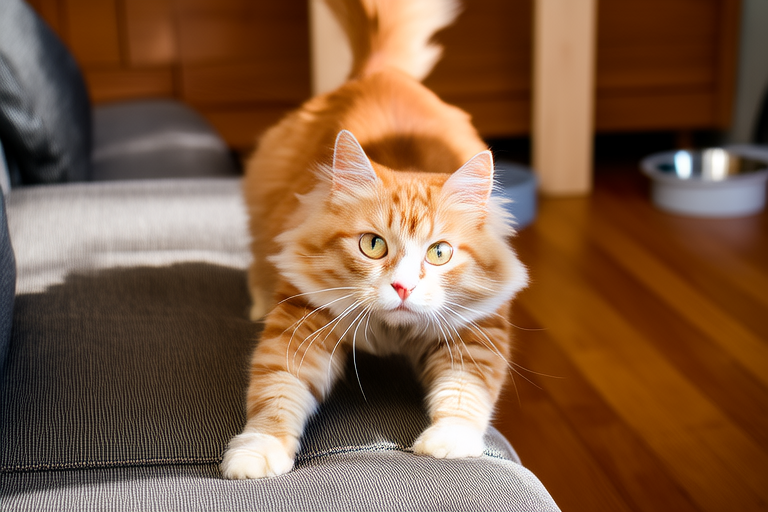Living with an Orange Cat: Tips from Happy Pet Parents
Orange cats, with their striking coats and unique personalities, have captured the hearts of many pet parents. These felines, often referred to as ginger or marmalade cats, bring warmth and joy into homes across the globe. If you’re considering adopting an orange cat or already share your life with one, this guide will provide valuable insights into their care, behavior, and health. From understanding their distinct personalities to ensuring they stay happy and healthy, this article offers practical advice from experienced pet parents.
The Unique Personality of Orange Cats
Orange cats are known for their friendly and sociable nature. Many owners describe them as affectionate and playful, often seeking attention and interaction with their human companions. However, it’s important to note that each cat is an individual, and while some orange cats are outgoing, others may be more reserved. Understanding your cat’s personality will help you tailor your interactions and create a loving environment that suits their needs.
Caring for Their Distinctive Coats
One of the most noticeable features of orange cats is their vibrant fur. While their coats can vary in shade from light cream to deep copper, they all require regular grooming to maintain their luster and prevent matting. Brushing your cat at least once a week can help remove loose hair and distribute natural oils, keeping their coat shiny and healthy. Additionally, providing them with a high-quality diet rich in essential fatty acids like omega-3 and omega-6 can promote skin and coat health.
Dietary Considerations
Feeding your orange cat a balanced diet is crucial for their overall well-being. High-quality commercial cat food that meets the nutritional requirements for your cat’s age, size, and activity level is recommended. Many orange cats have sensitive stomachs, so it’s important to choose a formula that is easy to digest. Consult with your veterinarian to determine the best diet for your specific cat, especially if they have any health conditions such as urinary tract issues or obesity.
Common Health Issues
While orange cats generally enjoy good health, there are certain conditions that are more prevalent in this breed. One common issue is obesity, which can lead to various health problems including diabetes and arthritis. Regular exercise and portion control are essential in preventing weight gain. Another concern is urinary tract infections, particularly in male cats. Keeping your cat hydrated by providing fresh water and encouraging them to drink can help reduce the risk of these infections.
Interactive Play Ideas
Orange cats are typically energetic and enjoy interactive play. Providing toys that stimulate their hunting instincts, such as feather wands or laser pointers, can keep them entertained and mentally engaged. Interactive play sessions not only help burn off excess energy but also strengthen the bond between you and your cat. It’s recommended to engage in playtime at least twice a day for about 10-15 minutes each session. This will help your cat stay physically fit and mentally stimulated.
Litter Box Management
Proper litter box maintenance is vital for the comfort and health of your orange cat. Scoop the litter box daily to remove waste and clean the entire box thoroughly once a week. Choose a litter that is unscented and dust-free to avoid respiratory irritation. Ensure the litter box is easily accessible and placed in a quiet area where your cat feels safe. The general rule is to have one litter box per cat plus one extra. This helps reduce stress and encourages regular use.
Testimonials and Anecdotes
Let’s hear from some happy pet parents who share their lives with orange cats:
Sarah from Chicago: “My orange cat, Max, has been a part of our family for five years now. He loves to curl up on my lap and purr softly when I stroke his soft fur. We’ve noticed that he enjoys playing with feather toys and laser pointers, which keeps him active and happy. His diet consists of a mix of wet and dry food, and we make sure to give him plenty of fresh water. Max is very social and enjoys meeting new people, making him a favorite among our friends and neighbors.”
John from New York: “Our orange tabby, Bella, has a unique personality. She is very independent but still craves attention. We found that she loves to chase after small toys and has even learned to fetch! We keep her entertained with interactive puzzles that dispense treats, which she finds both challenging and rewarding. Bella’s diet includes a variety of wet foods, and we rotate flavors to keep her interested. Her litter box is always clean, and she uses it consistently without any issues.”
Conclusion
Living with an orange cat can be a rewarding experience filled with love, laughter, and companionship. By understanding their unique personalities, providing proper care for their distinctive coats, offering a balanced diet, addressing common health issues, engaging in interactive play, and maintaining a clean litter box, you can ensure that your orange cat leads a happy and healthy life. Remember, every cat is different, so take the time to get to know your pet’s individual needs and preferences. With the right care and attention, your orange cat will bring endless joy and warmth to your home.
